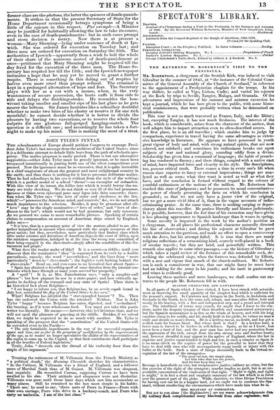JOHN TYLER'S SYNTAX.
Tam schoolmasters of Europe should petition Congress to expunge President John Tyler's last message from the archives of the United States; since it is a deliberate attempt to delude little boys from the path of scholastic propriety. The malice prepense is easily proved. There is but one alternative supposition—either John Tyler must be grossly ignorant, or he must have trespassed intentionally in putting forth one of the vilest compositions ever penned. Now the ignorance must be so excessive, that it is quite incredible in a chief magistrate of about the greatest and most enlightened country in the earth; and thus there is nothing for it but to presume deliberate malice. That he had schoolboys in his eye is evident from the style of the writing; which is a perfect model of a school "theme"—an exemplar ad evitandum. With this view of its intent, the follies into which it would betray the unwary are truly shocking. We do not think so very ill of the bad grammar, because at times even: episcopal pens may lapse into false concords; therefore when Mr. Tyler says "the love of order and obedience to the law, which"—" possesses the American mind, and controls," &c., we do not attach much importance to the solecism. Besides, it may be grammar after all: "love" may be the single nominative—" love of order," and "love of obedience to the law"; which would not be bad grammar, but only nonsense. .A3 we proceed we come to more remarkable phrases. Speaking of certain claims to compensation on account of American ships seized by England, John says— . " It is true, that in a pecuniary point of view the matters alluded to are altogether insignificant in amount when compared with the ample resources of that great nation; but they, nevertheless, more particularly that limited class which arise under seizures and detentions of American ships on the coast of Africa, upon the mistaken supposition, indulged in at the time the wrong was committed, of their being engaged in the slave-trade—deeply affect the sensibilities of this Government and people."
What does the reader make of this? It is a secret—a riddle; until you discover that the nominative " they" is separated from its verb by a double parenthesis, namely, the word "nevertheless," and the lines from "more particularly" down to "slave-trade"; the fugitive verb lurking behind the "slave-trade." Read on' anti you come to an historical fact about Spain " Spain has obtained a breathing-spell of some duration from the internal convulsions which have through so many years marred her prosperity." A " spell "! It is, as Mrs. Ramsbottom says, only a naughty-call phrase": but how piquant its use in a state-paper; and how critically apposite in dashing off the tranquil and easy state of Spain! Then there is an historical fact about Belgium " I am happy to inform you, that Belgium has, by an arrte royale issued in July last, asstmilated the Ay of the United States to her own." What! Belgium has adopted the "star-spangled banner "? No. Then has she endowed the Union with the tricolor? Neither. Nor is John Tyler " happy " because Belgium has eaten, digested, and " assimilated " the hunting, as if it were wholesome food. You mpst not take this poetic writer too literally. He means—however, this is Christmas time, and we will not spoil the pleasure of guessing at the riddle. Besides, if we solved that, we might be expected to do as much with another. Mr. Tyler is speaking of the prospect that the "constitution" of the United States will be extended even to the Pacific " The only formidable impediments in the way of its successful expansion, pace and time, are so far in the progress of modification by the improvement; of the age, as to render no longer speculative the ability of the representatives of the region to come up to the Capitol, so that their constituents shall participate in all the benefits of Federal legislation."
Truly, John " draweth out the thread of his verbosity finer than the staple of his argument."






















































 Previous page
Previous page